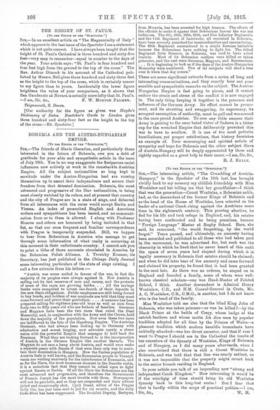BOHEMIA AND THE AUSTRO-HUNGARIAN EMPIRE.
[To THE EDITOR OP THE " arsexarost."]
San,—The friends of Slavic liberation, and particularly those interested in the future of Bohemia, owe you a debt of gratitude for your able and sympathetic article in the issue of July 10th. You in no way exaggerate the fissiparous racial influences now actively at work in the ramshackle Austrian Empire. All the subject nationalities so long kept in servitude under the Austro-Hungarian heel are rousing themselves up to assert their independence and secure their freedom from that detested domination. Bohemia, the most advanced and progressive of the Slav nationalities, is being most closely watched by its rulers, and at present that country and the city of Prague are in a state of siege, and debarred from all intercourse with the outer world except Berlin and Vienna. An index of proscribed English and American writers and sympathizers has been issued, and no communi- cation from or to them is allowed. I along with Professor
Monroe and others are honoured by being included in that list, so that our once frequent and familiar correspondence with Prague is temporarily suspended. Still, we happen to hear from Bohemians in America who manage to get through some information of what really is occurring at this moment in their unfortunate country. I cannot ask you to print a tithe of these accounts circulated in America by the Bohemian Polish Alliance. I. Tvrzicky Kramer, its Secretary, has just published in the Chicago Daily Journal
some interesting particulars of the state of siege existing. I cull a few extracts from his letters :-
"Austria was never united in favour of the war, in fact the majority of its peoples were always against it. Now Austria is calling out its last reserves of men and money, and the protests of some of the races are growing bolder. . . . All the savings banks were compelled to invest one-fourth of their deposits in the new State obligations. Public employees are still being forced to buy bonds, and holders of war contracts are told that they must come forward and prove their patriotism. . . . A measure has been prepared calling for eighteen-year-old boys as well as men from forty-two to fifty years old who are fathers of families. Germans and Magyars have been the two races that ruled the Dual Monarchy, and, in conjunction with the Army and the Crown, hold down the majority of the population. Now even these two races are indifferent to the fate of the Hapsburg Empire. The Austrian Germans, who had always been looking up to Germany with admiration and secret longing, now advocate openly a closer union with the powerful Empire that manages to hold back the Russians. What they are looking forward to is the incorporation of Austria in the German Empire like another Bavaria. The Magyars do not care a hang about Austria, and would even make a separate peace with Russia if that were their only way to main- tain their domination in Hungary. How the Italian population of Austria feels is well known, and the Roumanian people in Transyl- vania are waiting anxiously for the interference of Roumania, and as for the Slays, the most numerous element in the Danube realm, it is a notorious fact that they cannot be relied upon to fight against Russia or Serbia. Of all the Slays the Bohemians are the most advanced and progressive, and therefore. the Government of Francis Joseph has the most trouble with thorn. Newspapers will not be patriotic, and so they are suspended and their editors jailed and occasionally shot. Cyril Duset, editor of the Prague daily Gas, has just been sent to jail for six months, and the daily Ceske Stove has been suppressed. The Socialist Deputy, Bechyne,
from Moravia, has been arrested for high treason. The efforts of the officials to make it appear that Bohemians favour the war arc ludicrous. The 8th, 28th, 36th, 88th, and 91st Infantry Regiments and the 11th Regiment of ibandwehr, ail recruited in Bohemia, have been severely punished for insubordination and surrendering. The 28th Regiment surrendered to a single Russian battalic'u because the Bohemians have nothing to fight for. The 102nd Regiment from Benesov, in Bohemia, was said to have acted bravely. Most of its Bohemian soldiers were killed or taken prisoners, and the rest were Germans, Magyars, and Roumanians. . . . It is beginning to look as if the days of the Austro-Ilungarian Monarchy were numbered. Few of its subjects will shed a tear over it when that day comes."
These are some significant extracts from a series of long and interesting communications, and they exactly bear out your sensible and sympathetic remarks on the subject. The Austro- Hungarian Empire is fast going to pieces, and it cannot endure the strain and stress of the conflict it is now engaged in. The only thing keeping it together is the presence and influence of the German Army. Its effect cannot be perma- nent, and its strutting and swaggering, its supremacy, its arrogant assumption of authority, must be gall and wormwood
to the once proud Austrian. To owe any little success their Army is gaining to the once hated victor of Sadowa is a bitter
cup for the wretched Empire that deliberately provoked this war to have to swallow. It is one of the most pathetic humiliations, yet proper retributions, that history furnishes an example of. Your encouraging and spirited article of sympathy and hope for Bohemia and the other subject Slays of Austria-Hungary will be deeply appreciated by them and rightly regarded as a great help to their cause.—I am, Sir, &c., R. J. KELLY.


































 Previous page
Previous page